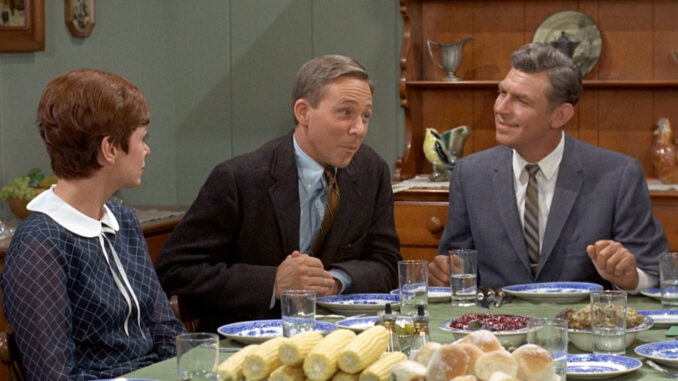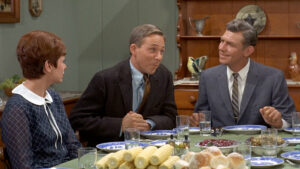

Try telling viewers of a certain age about the immense popularity of “The Andy Griffith Show” back in the day and you’re likely to be met by blank stares, quite a number of follow-up questions, or both. Looking back, it may be surprising to realize that neither Andy Griffith nor the show itself garnered any major awards love throughout the eight seasons it was on the air, never resulted in much of any real merchandising profits during its run (which was a rarity at the time), and even met a somewhat ignominious end when Griffith was written out of the sitcom series and the entire production became rebranded as “Mayberry R.F.D.”
In between those extremes, however, “The Andy Griffith Show” maintained its status as a consistent ratings juggernaut throughout each and every year and vaulted its cast to stardom. Buoyed by Griffith’s “Aw shucks” small-town and square-jawed heroic appeal, an all-time classic opening theme song, and an overall tone suitable for all ages and especially kids, the hit show has managed to cast a very long shadow.
In the decades since its premiere in October of 1960, however, it’d be the understatement of the century to say that quite a lot has changed. While Griffith’s Sheriff Andy Taylor and his supporting cast of various friends and family in the fictional town of Mayberry, North Carolina will always rank among the best sitcom characters ever, the long years have left their mark on the stars and fans alike. By now, many of the actors have long since passed away, including Griffith himself in 2012, but there still remain a number of living links to the show — including a few very familiar faces. Here’s all the major actors still alive from “The Andy Griffith Show.”

Ron Howard
You recognize that rascally redhead with a spark in his eyes, don’t you? Long before he took the reins on “Willow,” blasted Tom Hanks into space on an ill-fated mission, and provided the perfect amount of deadpan comedy as the narrator on “Arrested Development,” Ron Howard got his first prominent role in the industry by landing the gig of a lifetime on “The Andy Griffith Show” at an incredibly early age. As Sheriff Taylor’s young son Opie, Howard appeared in the vast majority of episodes (well over 200 of them) and thoroughly put his widowed father’s parenting skills to the test. In essence, audiences were able to watch the fresh-faced Howard grow up right in front of their eyes throughout the eight seasons of the sitcom, getting a taste of all the nuances and complexities inherent in the idea of growing up into one’s teenage years alongside Opie.
In the decades since, Howard continued to act (most famously appearing in George Lucas’ “American Graffiti” in 1973) before ultimately returning to his clear passion: directing. By the early 2000s, the filmmaker had fully established himself as a supremely confident and capable journeyman with several box office hits and critically acclaimed films under his belt — from “A Beautiful Mind,” “Cinderella Man,” and “Frost/Nixon” to more recent efforts such as “Rush,” “Solo: A Star Wars Story” (which he famously took over mid-production and brought across the finish line), and last year’s “Thirteen Lives.” Now 69 years old, Howard shows no signs of slowing down anytime soon. But for many fans, he’ll always be the freckled and surprisingly kind-hearted Opie.
Elinor Donahue
One of the recurring storylines in “The Andy Griffith Show” was that, as a widower, Andy Taylor was always on the lookout for a love interest. One of the earliest such characters intended to become a series regular was Ellie Walker, played by Elinor Donahue. A local pharmacist who only appeared in a handful of episodes in the first season, Ellie nonetheless made her presence felt on Mayberry. Beyond her flirty friendship-turned-romance with Andy, one significant storyline featured her running for town council. Facing fierce resistance due to the historically male-dominated position, the episode (titled “Ellie for Council”) follows her tireless efforts to prove such antiquated notions wrong and marks one of the rare instances of an episode aired in the 1960s that directly tackled the idea of equality between the sexes.
Leave a Reply